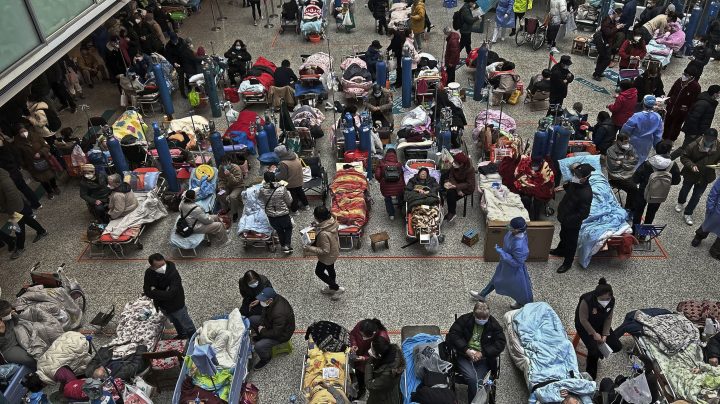
China’s big question after ending “zero-COVID” rules: How many have died?
China’s big question after ending “zero-COVID” rules: How many have died?

When China’s leaders suddenly dropped “zero-COVID” rules in early December, a lot of people took extra precautions and stayed home, including an 83-year-old father in northeastern China.
His son, David, only wants to use his first name in English to avoid government harassment.
“My dad got a fever on Dec. 19. We don’t know how he got infected with COVID,” David said.
Public health experts there said hundreds of millions of people were infected within weeks. Yet China initially reported just a handful of deaths each day because Chinese officials narrowed what constituted a COVID-19 death. Only people who died of pneumonia or respiratory failure caused by COVID and not other underlying diseases were officially counted. This differed from the World Health Organization, which defines COVID deaths as any cases where “the disease caused, is assumed to have caused, or contributed to the death.”
David’s father had a fever for the first three days. The next morning, his father fainted and hit his head. It took seven hours before an ambulance came.
Once they arrived at the hospital, it was chaotic, according to David.
“My dad’s doctor and all the nurses were infected and coughing,” he said. “He saw the doctor only once during his stay.”
The hospital treated his dad’s head injury but had no antivirals for his lung infection. A second hospital wasn’t much better; it ran out of oxygen.
“I had to carry an oxygen tank from home to the hospital for my father,” David said.
In early January, his father was moved to an intensive care unit. “Within 36 hours, the hospital called to announce that my father had died. The death certificate lists the cause as ‘respiratory failure,’” he said.

This meant that — at the time — David’s father was not included in the official COVID-19 death toll.
David is angry.
“What preparations did officials make these past three years? They only focused on mass testing and vaccines. There were no preparations at the hospitals,” he said.
Not only were hospitals packed, but funeral homes were too.
“The situation at funeral homes was horrible. There were no time slots for cremation, no space at the morgue,” David said.
In the end, David was able to get a time slot at a crematorium in another town. The funeral was held three days after his father died, according to tradition. But other aspects of his father’s funeral were less than traditional.
“Usually, the body must also be cremated and the ashes buried before 12 p.m. Now those rules have gone out the door,” he said.
For years, Chinese government media have criticized America’s fight against the pandemic as an utter failure, with more than 1 million COVID-19 deaths.
But there has been very little public discussion of what China’s own death toll will be.

Citizens like David were only told that the snap lockdowns and economic slowdown of the last three years were necessary to protect the lives of the elderly. And while David wanted China to reopen, he did not expect that the restrictions would be lifted so abruptly, such that most households were initially scrambling for fever and cough medicine and hospitals and crematoriums were crammed.
David is taking a risk speaking to Marketplace. People who criticize Chinese leaders’ handling of the pandemic are often censored, even detained.
“China censors a lot of information. No domestic Chinese media would interview me, an ordinary man, about losing his father to COVID,” David said. “I’m very glad to have this space to talk about it.”
He said his dad was the first among his siblings to go to a university in the 1960s, which brought “glory to his family.” David describes his father as reserved, a hard worker, well-loved, well-respected and well-traveled.
In a copy of his father’s eulogy shared with Marketplace, David told his father to go peacefully.
“There is no coronavirus in heaven. There is no hammer and sickle gang,” David said in reference to the Communist Party of China.
A few days after David spoke to Marketplace, and under pressure from WHO, China tweaked its death toll to include those caused by COVID-related illnesses. That brought the toll to 82,000 deaths over the last two months, but only people who died in hospitals and not at home were counted.
It is not clear if David’s father’s death is included in the new figure.
There’s a lot happening in the world. Through it all, Marketplace is here for you.
You rely on Marketplace to break down the world’s events and tell you how it affects you in a fact-based, approachable way. We rely on your financial support to keep making that possible.
Your donation today powers the independent journalism that you rely on. For just $5/month, you can help sustain Marketplace so we can keep reporting on the things that matter to you.












